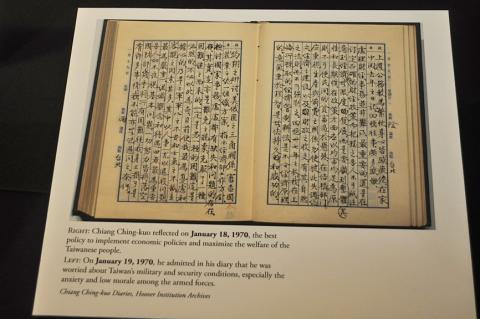Stanford University’s Hoover Institution on Tuesday gave a preview into the personal diaries of former president Chiang Ching-kuo (蔣經國), which are to be open to public viewing starting in February.
The diaries show Chiang focused on Taiwan’s political and economic development in the late 1960s and early 1970s, in sharp contrast to his father, Chiang Kai-shek (蔣介石), said Lin Hsiao-ting (林孝庭), curator of East Asia collections at Hoover Institution Library and Archives.
Based on the elder Chiang’s diaries, “his heart was always with mainland China, and he was mostly interested in retaking the mainland,” Lin said.

Photo: CNA
The Chiang Ching-kuo diaries cover May 1937 to December 1979, and offer insight into his life from the time he returned to China from Soviet Russia and his move to Taiwan.
The diaries of the year 1948 were lost, while the entries from 1937 to 1940, and from 1945 to 1949 are transcripts, and the rest are handwritten originals, Lin said.
Chiang Ching-kuo, who served as president from 1978 until his death in 1988, stopped keeping a diary in 1979 for reasons that are not known, Lin said, adding that it might be due to health problems, because he underwent prostate surgery that year.
During the preview, the institution showed a selection of the copied and original Chiang Ching-kuo diaries, focusing mostly on his participation in major decisionmaking processes in Taiwan after 1949.
Among the most notable entries was his reaction after he was told in the early hours of Dec. 16, 1978, by then-US ambassador Leonard Unger that Washington was severing ties with Taipei.
It was a hard blow for Chiang Ching-kuo, who wrote: “[I am] in agony. While shouldering heavy responsibilities, [I] should handle it rationally and calm people down first.”
He also wrote that he thought Taiwan’s “strength” and “morality and sense of justice” would serve as the core of the nation’s diplomacy thereafter.
According to entries written on Jan. 18, 1970, he said the best policy for Taiwan was developing the economy, and he wanted to work for the well-being of the people.
The diaries are to be available for public viewing in their entirety at the Hoover Archives’ Reading Room, which is to open in February. They will also complement the collection of diaries from 1915 to 1972 left by his father, who led China from 1928 to 1949 and then ruled Taiwan after the Chinese Nationalist Party (KMT) lost the Chinese Civil War to the communists in 1949 until his death in 1975.
The elder Chiang’s diaries were made public by the institution in 2006 and have since been the most requested collection in the institution’s possession.
The institution has held the diaries of the Chiangs since 2005, when Chiang Ching-kuo’s daughter-in-law Chiang Fang Chih-yi (蔣方智怡) signed a 50-year agreement for the documents to be curated by the institution.
Legal disputes over ownership of the diaries have been ongoing since, but all parties involved last summer agreed to make them public to facilitate research.

Alain Robert, known as the "French Spider-Man," praised Alex Honnold as exceptionally well-prepared after the US climber completed a free solo ascent of Taipei 101 yesterday. Robert said Honnold's ascent of the 508m-tall skyscraper in just more than one-and-a-half hours without using safety ropes or equipment was a remarkable achievement. "This is my life," he said in an interview conducted in French, adding that he liked the feeling of being "on the edge of danger." The 63-year-old Frenchman climbed Taipei 101 using ropes in December 2004, taking about four hours to reach the top. On a one-to-10 scale of difficulty, Robert said Taipei 101

Nipah virus infection is to be officially listed as a category 5 notifiable infectious disease in Taiwan in March, while clinical treatment guidelines are being formulated, the Centers for Disease Control (CDC) said yesterday. With Nipah infections being reported in other countries and considering its relatively high fatality rate, the centers on Jan. 16 announced that it would be listed as a notifiable infectious disease to bolster the nation’s systematic early warning system and increase public awareness, the CDC said. Bangladesh reported four fatal cases last year in separate districts, with three linked to raw date palm sap consumption, CDC Epidemic Intelligence

Two Taiwanese prosecutors were questioned by Chinese security personnel at their hotel during a trip to China’s Henan Province this month, the Mainland Affairs Council (MAC) said yesterday. The officers had personal information on the prosecutors, including “when they were assigned to their posts, their work locations and job titles,” MAC Deputy Minister and spokesman Liang Wen-chieh (梁文傑) said. On top of asking about their agencies and positions, the officers also questioned the prosecutors about the Cross-Strait Joint Crime-Fighting and Judicial Mutual Assistance Agreement, a pact that serves as the framework for Taiwan-China cooperation on combating crime and providing judicial assistance, Liang

US climber Alex Honnold left Taiwan this morning a day after completing a free-solo ascent of Taipei 101, a feat that drew cheers from onlookers and gained widespread international attention. Honnold yesterday scaled the 101-story skyscraper without a rope or safety harness. The climb — the highest urban free-solo ascent ever attempted — took just more than 90 minutes and was streamed live on Netflix. It was covered by major international news outlets including CNN, the New York Times, the Guardian and the Wall Street Journal. As Honnold prepared to leave Taiwan today, he attracted a crowd when he and his wife, Sanni,